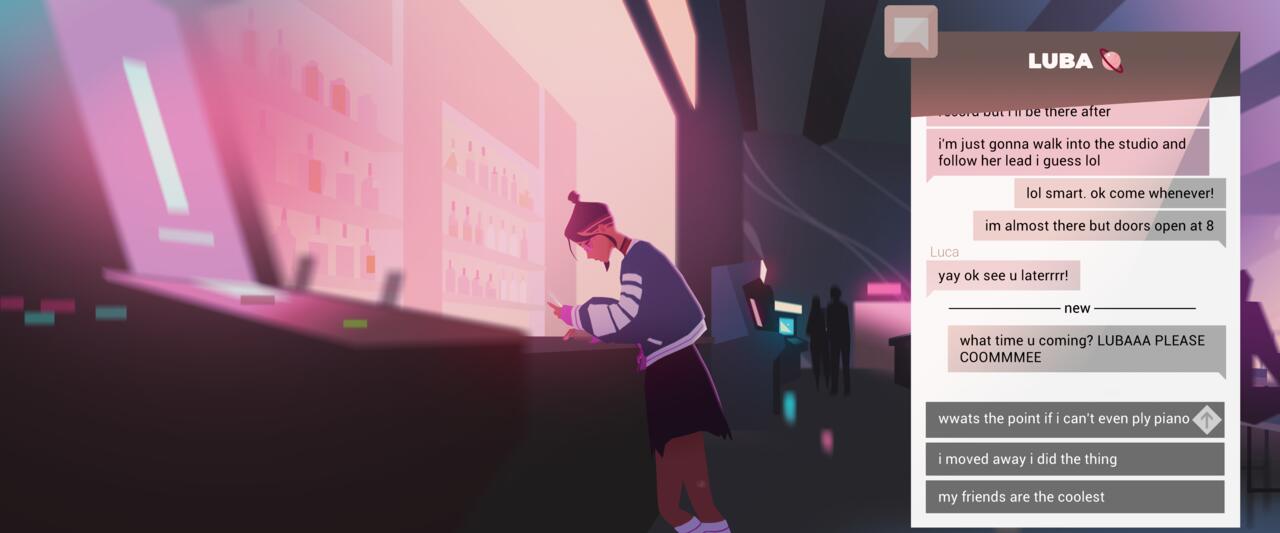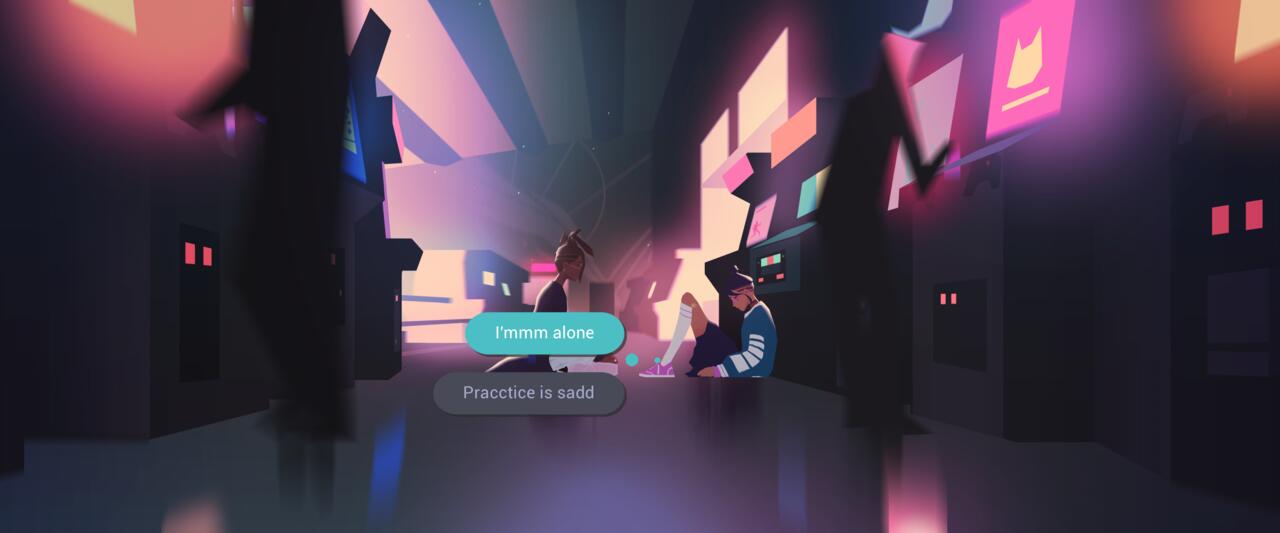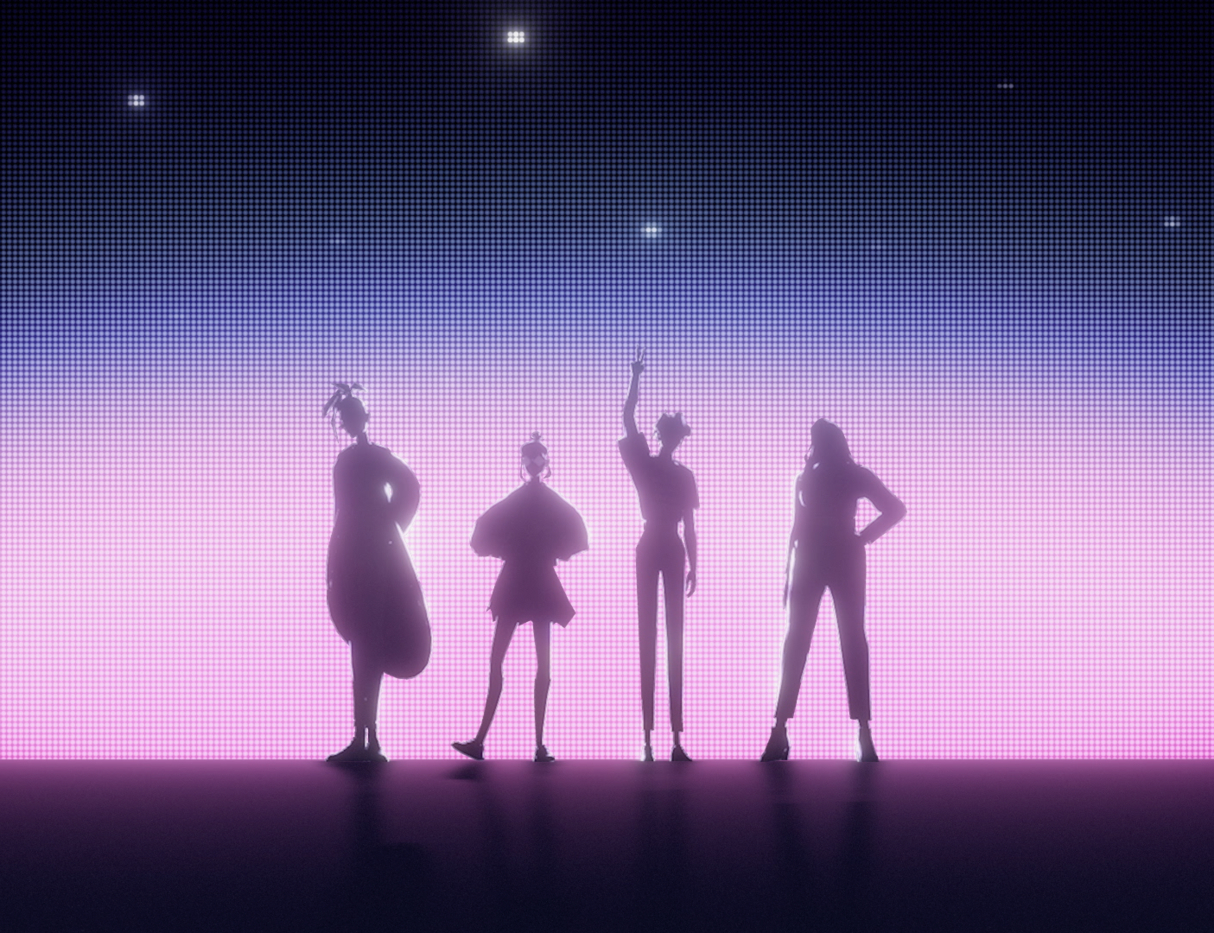Episodic visual novel We Are OFK has a really cool premise. This five-part adventure mixes in notes of a biopic to detail the origin of a real band known as OFK, a group entirely composed of virtual members. It’s a fictional story about a real band made of fictional people who make real music because they’re tired of working for fictional companies. It’s like if there was a game about Hatsune Miku or K/DA that detailed their lives prior to their rise to fame. All told, it’s a great story, and though I do wish that the dialogue choices had been more impactful, We Are OFK is an emotionally rewarding tale that explores the fraught and oftentimes cutthroat nature of Los Angeles’ music industry through the lens of easily digestible themes and relatable characters.
We Are OFK follows pianist Itsumi Saitō, singer/songwriter Luca Le Fae, audiovisual artist Carter Flores, and producer Jey Zhang, and depicts how their lives come to intersect. The point A to point B throughline of the story culminates in Itsumi, Luca, Carter, and Jey forming a band. You know going in that this is the outcome you’ll see. But on the way to that destination, the story takes regular detours into Itsumi’s love life, Luca’s writer’s block, Carter’s existential crisis, and Jey’s familial pressures. It’s in these other storylines that We Are OFK adopts a more slice-of-life style of storytelling, concluding with most of these issues left partially unresolved.

If anything, that only makes the conclusion to We Are OFK all the more satisfyingly believable and wonderful to reach. There are no typical bad guys here for the group to overcome and get their happily-ever-after ending. This is a story of what it means to grow, both as a person and as a group, and how that can come in many different forms and also occur at a different pace person-to-person. Carter’s arc is notably exceptional in its execution and probably my favorite storyline of the four. The arc sees them grappling with grief and coming to terms with what it means to leave a mark on the world while working within an industry where your work can be quickly forgotten. Itsumi has a similarly strong narrative path from the first episode to the last, which largely digs into her feelings of inadequacy and fear of being alone. Both characters resonated with me in a way that Luca and Jey did not–both do have strong storylines, but they don’t feel as compelling as Itsumi or Carter.
You don’t get to control Itsumi, Luca, Carter, and Jey’s actions or thoughts on their respective journeys–Itsumi’s life will always be adrift following a break-up and she will always experience a loss of passion for the piano, for example, and you can’t prevent Luca from reaching out to an emotional support tipline after his job leaves him feeling isolated and creatively parched, but We Are OFK allows you to guide how the four express themselves in their conversations with one another.
Dialogue choices represent a bandwidth of how a character can express themselves in a given moment. For instance, when Itsumi is being hit on by a creepy guy at a bar, she thinks about different ways she can say, “Go away,” to get out of the conversation. This does allow you to color We Are OFK’s story with your own brush, but it’s not very rewarding, as the game simply provides you with different shades of the same color. Regardless of whether you try to ignore the guy or change the subject, it all boils down to Itsumi trying to leave the conversation without making too much of a scene. There’s not much meaning behind the choices you pick as a result, as you’re more or less just getting different flavors of the same response. In the case of this example, Jey ultimately always has to step in because the guy isn’t taking a hint.
A few times, We Are OFK does include a fun callback to a previous moment in its story and makes reference to a dialogue choice you made. These moments are few and far between, however, and only occur within the same episode–your choices in Episodes 1 and 2 have no effect on what occurs in Episodes 3, 4, and 5. There are jokes, references, and callbacks that span multiple episodes, such as Itsumi and Carter changing one another’s names in their phone contacts list in Episode 5 to reflect a heart-to-heart conversation they had in Episode 4, but these narrative payoffs are in reference to scripted moments you have no control over. They’re fun to notice and add an extra bit of authenticity to the character development of the core cast–I know at least a dozen people who list their closest friends on their phone by dumb nicknames or pun-inspired titles, so seeing Itsumi and Carter do it made me laugh–but they’re a reminder that you don’t have much sway on this story. You’re more a passive observer than an active part of the group.
It’s odd–We Are OFK features more opportunities for player input than what I largely expect of a visual novel, but that increase in interactivity does not then translate into the potential to make a meaningful difference in the story. The game feels at odds with whether it wants the player to participate or just watch.
Between the two, We Are OFK feels like it’s most leaning towards the latter, as its episodic format more closely resembles a TV show than a video game. Each episode is about an hour long (the longest is closer to an hour and a half), features an intro sequence and credits, and–after the simultaneous release of Episodes 1 and 2–will release on a weekly schedule. Each episode concludes with an intriguing setup for whatever is next, working as a good draw to entice folks to tune in the following week. However, Episodes 2 and 3 are noticeably weaker than the rest of the game, as they, respectively, focus on Luca and Jey’s less interesting narrative arcs. Having all five episodes available at once allowed me to easily push through these rougher patches, but some players might not be motivated to return if they’re forced to wait a couple of weeks to get to Episode 4.

The most interactive elements of We Are OFK occur near the end of each episode when you play through a music video. Each video features one of the singles included in OFK’s first EP. There’s no way to fail these segments; instead, they allow you to inject a bit of creativity into the construction of the video. For example, near the end of Episode 1, you control Itsumi as she completes various tasks, chases her phone, and pushes people away from her during OFK’s debut song, Follow/Unfollow. The song sees Luca singing about moments of self-sabotage following an especially heartbreaking end to a relationship, and, up to that point, Episode 1 largely focuses on Itsumi as she struggles with those very feelings. So as her internal conflict reaches a climax, you can interpret how she’d react to the words Luca is singing. Maybe you think she’d do everything at a frantic pace, or perhaps she’d carefully move through the scene, or even keep messing up at the task at hand and get nothing done.
I really like these moments, especially the ones when the interactive elements are mechanically minimalist and allow you to better react to the music and exist within the flow of the song. Episode 4’s music video suffers in this regard, as it sees you playing as Carter and needing to skateboard through virtual reality, steering and jumping to collect tokens. There’s also a building segment interspersed between the skateboarding parts, where you can place hills, trees, rocks, and other decorations onto a spinning environment to create your own custom island. It’s a lot, which makes it trickier to also pay attention to the song itself.
You can replay each episode or music video after completing them once, so you can easily go back and redo any segments of the story or songs that you missed the first time, but the initial amazement of that first time is lost on subsequent playthroughs. A great deal of the enjoyment that comes with the music videos is related to being thrust into a new chorus or verse and being handed new mechanics, encouraging you to adapt and exist within the tone of the song and the narrative themes that lead up to it. There’s less surprise and, consequently, less enjoyment on repeated runs.

That said, I did still replay certain music video segments a few times if only to listen to specific songs again. OFK’s first EP is a banger from start to finish. The band’s first five songs all fall into alternative indie, but tonally cover a wider spectrum of emotions, ranging from celebratory and high-energy to more melancholy and dream-like. The songs that play near the end of Episodes 2 and 5 are notable stand-outs–the former has been stuck in my head all week, while the latter is a great get-up-and-dance-right-now track.
The game’s visuals complement the music style, dressing the characters and environments in vibrant colors. Though this style most comes alive during the music video segments to visually illustrate each song with flashing color, it’s used to great effect throughout the entire visual novel. We Are OFK’s Los Angeles is detailed with all the sun and glamour of possibility that the city is often idealized as having, especially in the early chapters. It almost seems like a dream, with how colorful and exciting everything is. And that’s exactly what that preconception is: a figment of the imagination. The real LA is alive with possibility, but–as the cast of young creators quickly learns–there’s a harsh reality of bills to pay, expectations to meet, and heartbreak to work through that’s hidden beneath that glittering glam. And in those moments, when the facade of LA falls away, the color of the game shifts from bright pinks, yellows, purples, and blues to more somber shades of brown, red, orange, and black. It’s great for setting the tone of a scene.
All in all, I enjoyed my time with We Are OFK. Even for a visual novel, the storyline can feel a bit too on the rails at times, but Itsumi, Carter, Luca, and Jey’s journey is poignant in its relatability and powerful in its narrative exploration through music. This is best expressed in the interactive music video segments, especially when they allow you to fully lose yourself in the song and respond to the vocals, rhythm, or accompanying visuals in your own way. It’s a good opening track for OFK’s career, and I can’t wait to see what’s in store for the virtual group.

